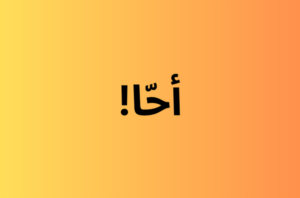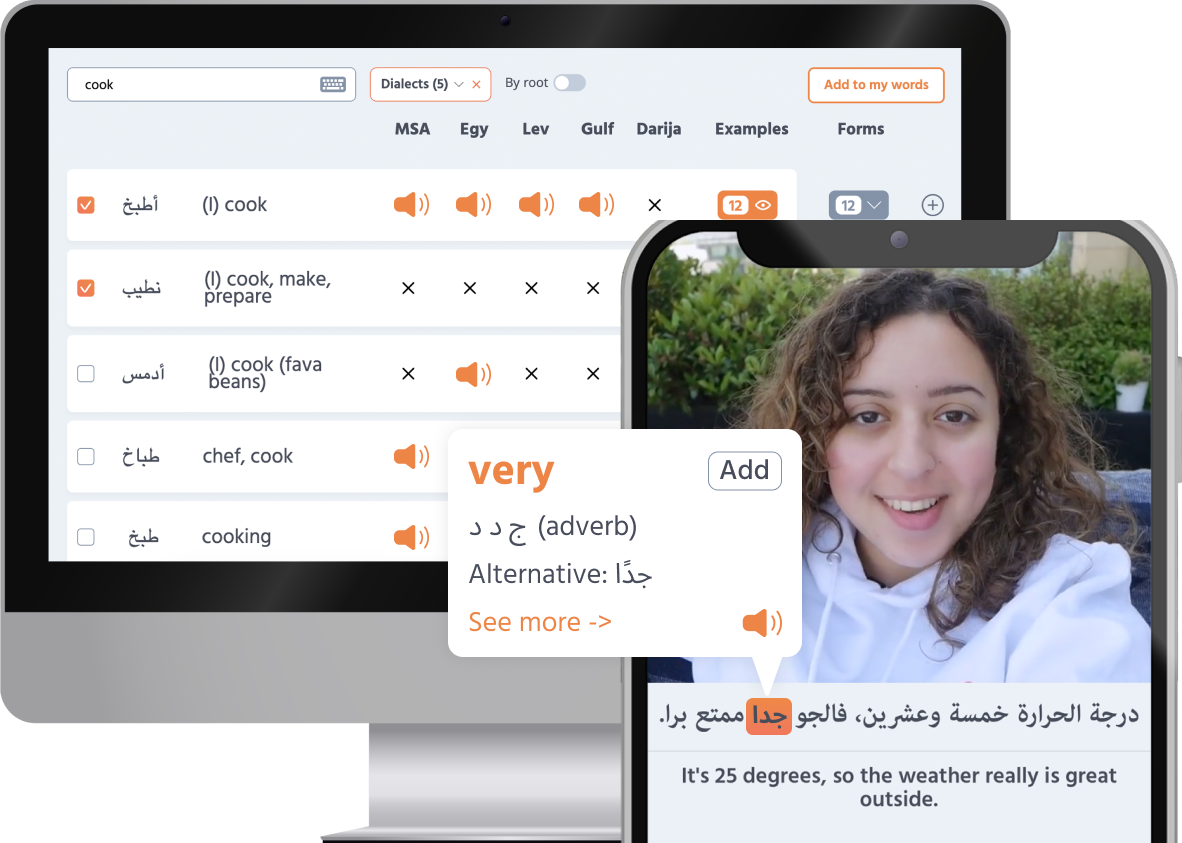Are you eager to dive into the rich and diverse world of the Arabic language? Whether you’re planning a trip to an Arabic-speaking country or simply want to impress your friends with your linguistic skills, learning some Arabic everyday phrases can be a fantastic start . This post will guide you through essential phrases in various Arabic dialects: Egyptian, Levantine, Gulf, and Darija. Let’s make Arabic fun and accessible!
Why learn Arabic? Arabic is spoken by over 400 million people across 22 countries. It’s a language of history, culture , and tradition . Knowing just a few everyday Arabic phrases can enhance your travel experiences, deepen your cultural understanding, and connect you with native speakers on a personal level.
Dialects of Arabic Arabic has many dialects , each with its unique flavor. While Modern Standard Arabic (MSA) is used in formal settings, Arabic everyday phrases are almost always spoken in regional dialects during everyday conversations. Here, we’ll focus on four major ones:
Egyptian Arabic Levantine Arabic Gulf Arabic Darija
Greetings To learn how to say common greeting phrases in Arabic , read on:
Hello Read more in our article, “How to Say Hello in Egyptian Arabic: A Cultural and Linguistic Guide. “
Levantine :
مَرْحَبَا
عَوَافِي
السَّلام عليكم
أهلا
(This word is used exclusively as a greeting response in the Levant to the word مرحبا
. It is not typically used to initiate a greeting but rather as a reply. The greeting starts with مرحبا
and the response is either أهلا
or أهلين
or أهلًا
)
A man and woman greet each other in Syrian Arabic .Gulf السَّلَام عليكم
قوّة
To a male To a female حياكَ الله
حياكي الله
Darija :
السَّلَام عَلَيْكُمْ
سَلَامْ
مَرْحَبَا
How are you? Below, in the table, are the most common basic phrases for saying “How are you?” in all dialects. Don’t miss exploring more phrases for saying “How are you?” in the Levantine dialect .
Dialect To a male To a female Egyptian إِزَّيَّكْ؟
إِزَّيِّكْ؟
Levantine كِيفَكْ؟
كِيفِكْ؟
Gulf شْلُونَكْ؟
شْلُونِك؟
Darija لَابَاسْ؟
A man and woman chat in Egyptian Arabic, asking about each other’s well-being. Good morning Levantine صَبَاح الخير
To a male To a female يِسْعِد صَباحَك
يِسْعِد صَباحِك
A clip from “Tababa,” a popular Jordanian series . Gulf صَبَاح الخير
To a male To a female صَبَّحك الله بِالخير
صبَّحك الله بالخير
Good evening Two Egyptians meet for the first time.Levantine مسا الخير
To a male To a female يسعد مساك
يسعد مساكي
Gulf مساء الخير
To a male To a female مسّاك الله بالخير
مسّاكي الله بالخير
Good night Dialect To a male To a female Egyptian تصبح على خير
تصبحي على خير
Levantine تصبح على خير
تصبحي على خير
Gulf تصبح على خير
تصبحي على خير
Darija تصبح على خير
تصبحي على خير
Goodbye Levantine مع السّلامة
باي
To a male To a female الله معك
الله معك
يعطيك العافية
يعطيكي العافية
بخاطرك
بخاطرك
Gulf مع السلامة
في أمان الله
To a male To a female الله معاك
الله معاكي
A Kuwaiti says goodbye to his guests and then starts thinking about all the dumb things he said during their visit. Common courtesy Mastering Arabic everyday phrases includes knowing the right expressions for courtesy. Phrases like “please,” “thank you,” and “excuse me” are essential for polite interactions.
Please Egyptian To a male To a female من فضلك
من فضلك
لو سمحت
لو سمحتي
Levantine إذا ممكن
To a male To a female لو سمحت
لو سمحتي
إذا بتريد
إذا بتريدي
Gulf To a male To a female ما عليك أمر
ما عليكي أمر
لو سمحت
لو سمحتي
من فضلك
من فضلك
A Jordanian woman explains how to politely ask for something . Thank you Egyptian ألف شكر
شكرًا
To a male To a female كتّر خيرك
كتّر خيرك
Levantine يِسْلَمُو
شُكْرًا
To a male To a female يِعْطِيك العَافْيَة
يعطيكي العافية
تسلم
تسلمي
Gulf شكرًا
To a male To a female ما قصَّرت
ما قصّرتي
يعطيك العافية
يعطيكي العافية
مشكور
مشكورة
Darija:
الله يجازيك بخير
بارك الله فِيك
شُكْرًا بِزَّافْ
You’re welcome Egyptian العفو
عفوًا
To a male To a female ولا يهمَّك
ولا يهمِّك
Levantine العفو
عفوًا
ولو
To a male To a female تكرم عينَك
تكرَم عينك
A Syrian man thanks the staff member after booking a room at the hotel. Gulf يَا هَلَا
عفوًا
To a male To a female ممنونة
ممنون
Darija :
Excuse me/Pardon me Egyptian To a male To a female أستأذنَك
أستأذنِك
عن إِذنَك
عن إذنِك
Levantine عفوًا
To a male To a female إذا بتريد
إذا بتريدي
ما تواخذني
ما تواخذيني
لو سمحت
لو سمحتي
From Tababa a Jordanian series. Gulf عفوًا
To a male To a female اسمح لي
اسمحي لي
لو سمحت
لو سمحتي
Darija To a male To a female سمح ليَّا
سمحي ليّا
Sorry/I apologize Egyptian معلش
بعتذر
To a male To a female حقَّك عليّا
حقِّك عليّا
A male A female أنا آسف
أنا آسفة
Levantine عفوًا
بعتذر
To a male To a female حقَّك عليي
حقِّك عليي
A male A female أنا آسف
أنا آسفة
متأسف
متأسفة
Gulf عفوًا
بعتذر
To a male To a female حقَّك عليّا
حقِّك عليّا
A male A female أنا آسف
أنا آسفة
متأسف
متأسفة
In this Gulf video, a boy apologizes . Darija كنعتدر
To a male To a female سمحلي
سمحي لي
Getting around When traveling, Arabic everyday phrases like “Where is…?” or “How much does it cost?” will be incredibly useful.
Where is…?
Egyptian : فين… ؟
Levantine : وين… ؟
A girl answers some questions , like where she is, using Palestinian Arabic .
Gulf : وين… ؟
Darija : فين… ؟
How much (it) costs?
Egyptian : بكام؟
Levantine : قدّيش؟
Gulf : بكم؟
Darija : بشحال؟
Yes/No Dialect Yes No Egyptian أيوة
لأ
Levantine إِي
لا
Gulf إيه
لا
Darija إيه
لا
A conversation between an upper-class Egyptian child and a middle-class Egyptian man . Note how they say ‘yes’ and ‘no’ in Egyptian Arabic. I don’t understand Egyptian A male A female مش فاهم
مش فاهمة
Cloze Listen activity from 10 Phrases to Solve a Misunderstanding on Playaling.
Levantine : ما فهِمت
Gulf : ما فهمت
Darija : مافهمتش
Can you help me? Dialect To a male To a female Egyptian ممكن تساعدني؟
ممكن تساعديني؟
Levantine فيك تساعدني؟
فيكي تساعديني؟
Gulf تقدر تساعدني؟
تقدري تساعديني؟
Darija واخا تعاوني؟
واخا تعاونيني؟
Dining out Knowing Arabic basic phrases for dining out ensures you can comfortably navigate restaurants and cafes.
I’m hungry Dialect To a male To a female Egyptian أنا جعان
أنا جعانة
Levantine أنا جوعان
أنا جوعانة
Gulf أنا جوعان
أنا جوعانة
Darija فيَّا جوع
A video about hungry Sammy from Alwan a Lebanese TV show. I’m thirsty Dialect To a male To a female Egyptian أنا عطشان
أنا عطشانة
Levantine أنا عطشان
أنا عطشانة
Gulf أنا عطشان
أنا عطشانة
Darija فيَّا لعطش
Delicious
Egyptian :
Levantine :
Gulf :
Darija :
The bill, please Egyptian To a male To a female الشيك، لو سمحت
الشيك، لو سمحتي
الحساب، لو سمحت
الحساب، لو سمحتي
Levantine To a male To a female الحساب، لو سمحت
الحساب، لو سمحتي
Gulf To a male To a female الحساب، لو سمحت
الحساب، لو سمحتي
Darija :
رِيسِي عَفَاك
بِشْحَالْ عَفَاكْ
Emergencies In an emergency, being able to use Arabic everyday phrases could be crucial.
Help! Dialect To a male To a female Egyptian إِلحقني
إلحقيني
Levantine ساعدني
ساعديني
Gulf إلحقني
إلحقيني
Darija عاونّي
عاونيني
Call the police Dialect To a male To a female Egyptian اطلب البوليس
اطلبي البوليس
Levantine اطلب الشّرطة
اطلبي الشرطة
Gulf اطلب الشّرطة
اطلبي الشرطة
Darija عيّط للبوليس
عيطي للبوليس
I need a doctor Dialect To a male To a female Egyptian أنا محتاج دكتور
أنا محتاجة دكتور
Levantine بحاجة لطبيب
Gulf أبي طبيب
Darija أنا خصني طبيب
Cultural notes Understanding the cultural context of these phrases is just as important as learning the words themselves. Here are a few tips:
Greetings : Arabic-speaking cultures place a high value on greetings . Take the time to greet people properly, and use the appropriate phrases depending on the time of day and formality of the situation.Politeness : Politeness is crucial. Always say please , thank you , and you’re welcome . It’s a sign of respect and good manners.Body Language : In many Arabic cultures, physical gestures, such as a handshake or a slight bow of the head, accompany greetings. Careful not to point the soles of your feet or shoes in the direction of anyone. Be mindful of personal space and gender interactions , as these can vary.Hospitality Offering and accepting tea or coffee is common , and it’s polite to accept at least a small amount.
The best way to learn these everyday Arabic phrases is through practice. Don’t be afraid to make mistakes. Arabic language learning is a journey, and every step brings you closer to fluency.
Oh, and by the way… If learning Arabic at your own pace, with fun, real-world videos sounds like your style, then Playaling could be exactly what you’re looking for!
With Playaling, you’ll dive into any major Arabic dialect or MSA. Our diverse range of videos has it all—from everyday conversations and cultural moments to music videos, TV and movie clips, influencer content, news broadcasts, and inspiring talks.
Our interactive captions let you tap any word for instant translations, context, and audio. So, real Arabic content becomes accessible with just a click. Miss something? No problem—rewind and listen as often as you need, or hover over subtitles for quick definitions.
Spot a word you want to learn? Save it to your personalized word set, or dive into curated sets for focused practice and easy review.
Interactive exercises let you dive in and practice what you’ve learned.
Need to look something up? The Audio Dictionary has you covered with clear human pronunciations and real world examples.
It’s a learning experience that keeps you engaged, bringing authentic, real-world Arabic closer to you every step of the way.
Give it a try!









